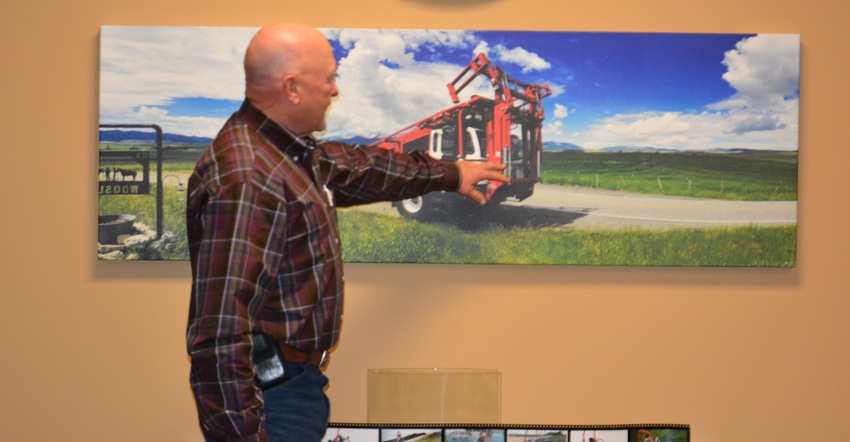
One of the things that Kansas Agri-Women strive to do — along with educating consumers about agriculture, advocating for farmers and working behind the scenes at events meant to showcase agriculture — is educate themselves about what is new and innovative in Kansas agriculture.
They did just that on Feb. 9 when they toured the Stinger manufacturing plant in the tiny Harvey County town of Burrton, gaining insight on a company that, like so many others in Kansas, got its start because a farmer had a problem he wanted to solve.
Brothers Larry and Bill Matlack bought their first big square baler and quickly discovered that what they needed was a bale wagon that could handle the larger bales in an efficient way. So in the way of farmers everywhere, they went into the farm shop and started working on building one.
Their original bale bus debuted in 1991, and they’ve been building and improving bale handlers ever since, with the new model 8500 debuting last year. They moved from the farm shop to a facility in Haven for several years and expanded into the current location in Burrton three years ago.

CLOSE TO READY: New 8500 Stinger bale handlers sit side by side in the Stinger shop. Salesman V.J. Blubaugh said the company has orders for 15 machines for delivery between now and July.
“We started out trying to develop the chassis from used models,” said Stinger salesman V.J. Blubaugh, who led KAW on a tour of the plant. “We tried a using a garbage truck chassis and an old farm truck chassis as a model, and a used school bus chassis. That involved a lot of cutting, modifying, fortifying, etc. Finally, we decided that just building from scratch would be a better way to go. We now use Crane Carrier Co. as a vendor for the chassis.”
The new 8500 model has been selling well, Blubaugh said. The model 8500 can load 125 bales an hour, picking up bales on the go through fields. He said Stinger has orders for 15 machines to build between now and July, and production is in full swing.
The company does a steady business in its earlier models, as well as wrapping equipment.
Global customers
Stinger markets to “big hay” country in the western U.S., as well as selling some machines into Canada and Mexico and some to customers in Australia and New Zealand.
Blubaugh said one thing that stands out about Stinger is that it builds bale wagons for big square bales, small square bales and round bales. Small square bales are bundled and can be picked up 21 at a time.
“Some of our competitors build equipment for square bales and some for round bales,” he said. “Stinger is the only one that does everything. We handle straw bales, hay bales and biomass bales.”
In addition to picking up and loading bales, Stinger bale wagons have easy unloading systems. The operator drives onto the field, drops the tailgate and keeps driving. The bales slide off the end, ready for the wrap to be completed.
The wagons offer multiple advantages. Its automated load securing system is controlled from the operator’s cab of the bale wagon and has front and rear bulkheads for clamping the load. Bales are stacked perpendicular to the trailer, rather than parallel as in most competitors.

KANSAS AGRI-WOMEN: Touring the Stinger plant are (front from left) Jerilyn Longren, Jean Goslin, Lisa Nichols and Lori Meiers; (middle) Wanda Kinney, salesman V.J. Blubaugh, Gayla Moeckel, Lynn Woolf, Lois Schlickau and Deanna Pierson; and (back) Barbara Kice, Barbara Roux and Lori Bammerlin.
“The automated system has safety advantages,” Blubaugh said. “There are no straps to throw so that means no workers in the load zone. That lowers the risk of employee injury and reduces insurance expense. There’s less turnover as well.”
The system also reduces the numbers of workers needed and reduces delivery costs.
In addition to picking up and stacking bales, Stinger makes equipment for wrapping cube-line stacks of bales or wrapping big round bales.
Stinger employs about 30 people, drawing workers from nearby Hutchinson and Newton.
About the Author(s)
You May Also Like






